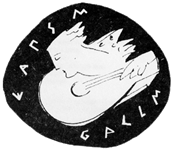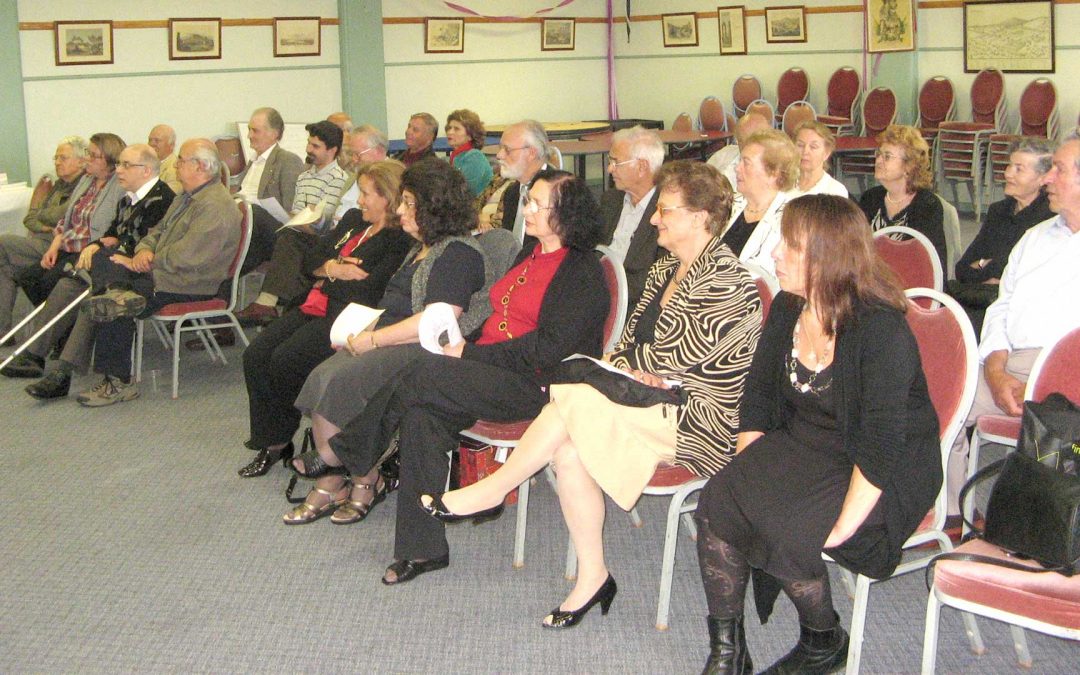
With this third Newsletter of 2016 we take the opportunity to inform you in advance about our future events so that you may organise your programme.
In particular, we would like to draw your attention to the fact that the dates of some scheduled events have changed since the circulation of the previous Newsletter (No. 2, June 2016).
We also like to remind you about the renewal of your subscription (if you have not done so already). You will find the information about subscription renewal at the end of this Newsletter. Please let us know via e-mail to membershipgacl@gmail.com that you had paid your subscription so that we can send you the appropriate receipt.
BOOK LAUNCHES
Postponed for 2017: the launch of the novel The Tear of the Moon by Athena Lefteriotou-Ginaki.
Postponed for 2017: the launch of two collections of poems by
Dina Amanatidou: Looking into the Soul and Reverberation of Silence.
• Sunday 18 December 2016, 3:00 pm
The Greek-Australian Cultural League and the Hellenic Writers Association of Australia jointly present the book by Vivienne Morris, Portraits of Hellenes in Antipodes Vol.2, at the mezzanine level of the Greek Centre, 168 Lonsdale Street, Melbourne.
Dr Maria Herodotou will be the guest speaker
and the historian Jim Claven will launch the
book.
LECTURE
•Sunday 27 November 2016, 3:00 pm
The Greek-Australian Cultural League of Melbourne in conjunction with the Hellenic Writers Association of Australia and the Pan-Epirotic Federation present the lecture, “The history of the Greek Typography in the years of the Ottoman occupation” by Dean Kalimniou, dedicated to the memory of Petros Petranis, the North Epirot printer who contributed so much to the Greek community of Melbourne, at the Mezzanine level of the Greek Centre, 168 Lonsdale Street, Melbourne. Dean Kalimniou will exhibit Greek publications printed between 1550 – 1841, from his own collection.
COLLABOTATION WITH IANOS
The Cultural Chain IANOS, the foremost place of connection of friends of books and art with the creators, the ideas, the currents and the trends of our era, this year completes 32 years of successful presence with a circuit of bookshops and Art shops, in Thessaloniki, Athens and also on the internet. It consists of nine vibrant shops and includes the website www.ianos.gr, which is one of the largest electronic shops for books, CDs, vinyl records and objets d’art in Greece.
The Cultural Chain IANOS envisions the contribution to and the dissemination of civilisation and culture by connecting people every day with the works and their creators, through a series of cultural events and the collaboration with like-minded organisations.
Additionally, it responds to requests from outside Greece as it has in stock and can send Books, New Editions, Best Sellers, CDs, text books used in Greek schools, Children’s Books, etc.
IANOS now collaborates with the Greek-Australian Cultural League of Melbourne and is at the disposal of our members for any clarification, additional information and request.
ANNUAL GENERAL MEETING
The Annual General Meeting of our League will be held on Sunday 4 December 2016, at 3:00 pm on the first floor of the Panarcadian Association “O Kolokotronis”, 570 Victoria Street, North Melbourne.
In accordance with the League’s Constitution, this year’s AGM will include the conduct of elections for a new Administrative Committee for the next two years (2017-18).
All financial members of the League are eligible to nominate for election, if they so desire.
We encourage you to nominate for election and to exhort your friends to nominate so that you create the opportunity for the A.C. to be renewed. The A.C. always needs new blood in order to develop and widen the activities of our League.
You will find the application form for candidature to the elections below in this Newsletter; if you wish to nominate for a position please complete the nomination form and mail it to the postal address of the League below, hand it to the General Secretary at the AGM, or email it to infogaclm@gmail.com, before the AGM. Please note that the nomination must be seconded by two members of the GACL.
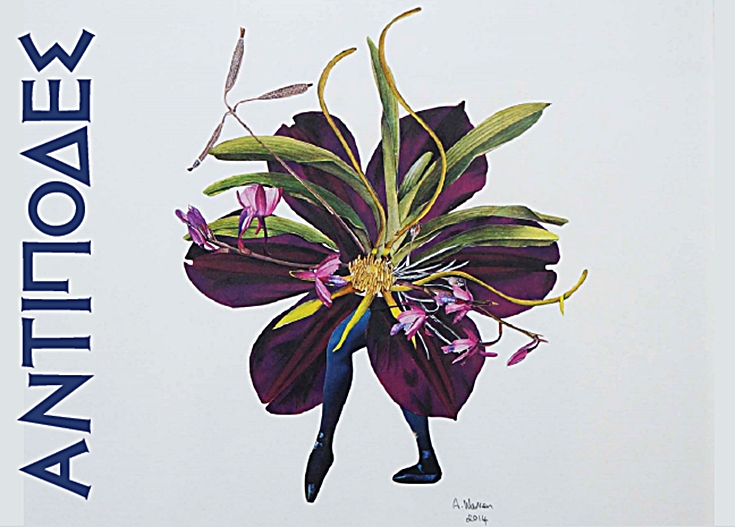
The 61st Volume of the literary periodical «ANTIPODES», together with the announcement of the results of the Literary Competition will be launched on the 15th November, 2015, at 3.00pm. at the Panarcadian Association “O Kolokotronis” building, 570 Victoria St., North Melbourne, 2nd floor.
This year the periodical pays tribute to academic Dr Thanasis Spilias for his contribution to the promotion of the Greek language and culture and to the memory of the poet, writer and academic Dr Aristides Paradissis. The periodical will be launched by Dr Chris Fifis.
Guests will be entertained by Anthea’s Rubies. All welcome.
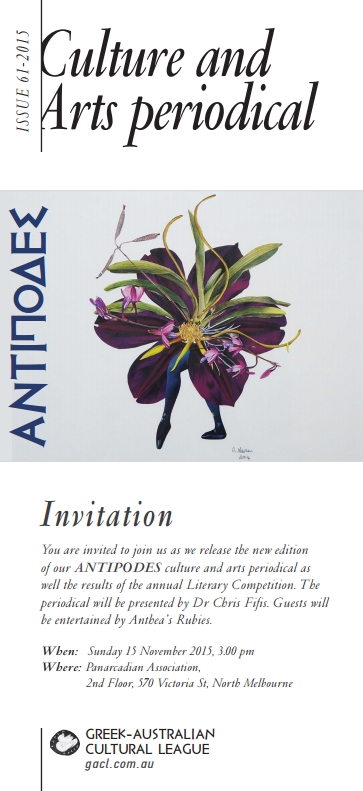
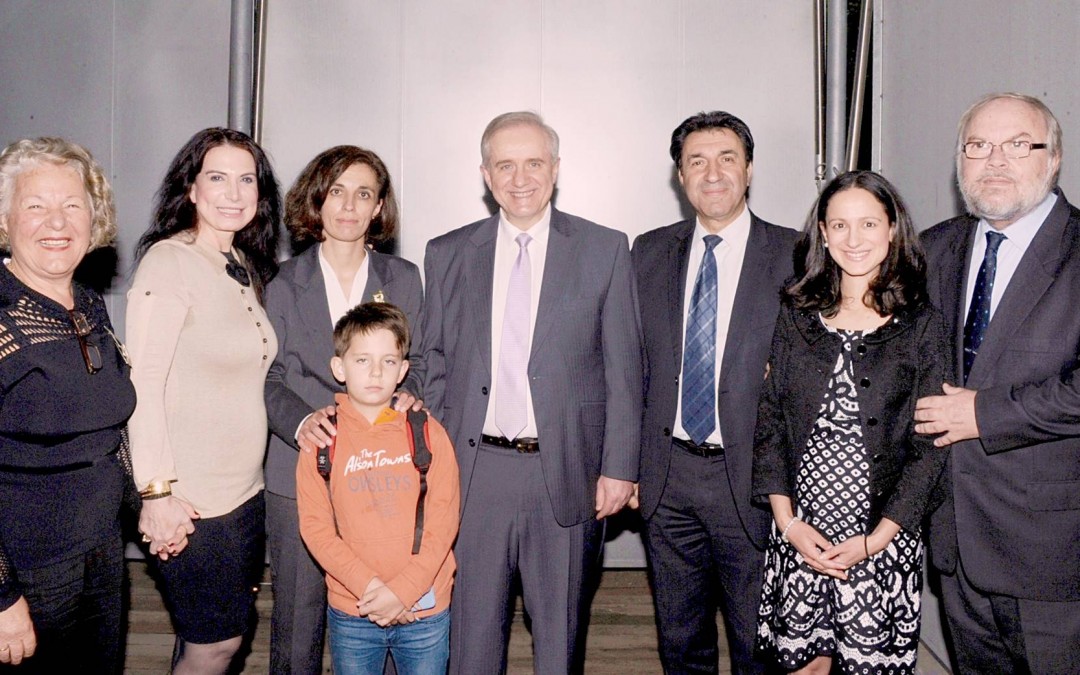
At the Hellenic Museum, Melbourne, under the newly constructed MPavilion, Justice Emilios Kyrou’s translated into Greek autobiography «Nα με λέτε Αιμίλιο» was launched on Monday 12th October, 2015.
The English version “Call me Emilios” was launched three years ago in the same premises and received much acclaim and interest. Justice Emilios Kyrou’s translation was prompted by the need and the desire to reach out to the first generation and make it accessible to them. The Greek translation, rendered most capably by third generation Greek, Georgina Dimopoulos, will add to the rich tapestry of Greek-Australian literature in the Diaspora.
The event was successfully organised by the Greek-Australian Cultural League and the Hellenic Museum of Melbourne, attended by a diverse audience from Politicians, Judges, lawyers, the clergy, business people, writers, the media, representatives from community organisations, friends and relatives of the authors and many other invited guests.
All the speakers added their own dimension to the launch, speaking in Greek and English, thus capturing the diverse audience with their messages and keeping the interest alive. The keynote speakers were His Excellency, the Ambassador of Greece to Australia; Mr Haris Dafaranos who spoke about Emilio’s vision in writing his book “Call me Emilios”.
Of the large number of Greek migrants to Australia only a few have written the story of the first the generation, of their parents, which is gradually departing the scene and thus passing onto the future generations certain messages, so that they will appreciate the ties that have linked Greece and Australia. Messages which maintain the enduring cosmopolitan values of Hellenism in the context of the wider Australian society.
Next Mrs Eyvah Dafaranos’ first observation in relation to the autobiographical book of Emilios Kyrou was the beauty of his thought. She said Emilios wrote in English but his thought has the clarity, the Mediterranean warmth, which is so amply projected and felt when you read the Greek text. Emilios’ story is characterised as well by an Olympian serenity.
Mrs Dafaranos expressed the opinion that Emilios Kyrou’s book is characterised by a particular humility. It is the kind of humility which is strong, does not boast; instead provokes questions and begs for answers. It is an autobiography which has the purpose to facilitate our own introspection so as to move forward, touching, exploring, discovering in a cathartic and liberating way.
The author, Emilios Kyrou took to the podium and thanked all concerned with the publication of the book, especially his translator, Ms Georgina Dimopoulos, his family, the organisers and the invited guests.
Using the additional photos that this new book is enriched with he captured the audience with a lighter tone relating the relevance of the additional material.
Finally the translator, Georgina Dimopoulos, highlighted the reasons why she accepted Emilios Kyrou’s request to undertake such a demanding task. Firstly she wanted the migrant story to be told and circulated to a broader audience and secondly she wanted to encourage the second and third generation to study and speak the Greek language in order to expand their horizons and ultimately value their own family’s story.
Cathy Alexopoulos, the President of the Greek-Australian Cultural League, was the M.C. for the proceedings and very briefly outlined the history of the GACL and how in the last 46 years it has promoted, and supported the endeavours of Greek-Australian writers as well as visual artists and musicians in a multitude of different ways. The launch of this book was an honour and a privilege thus justifying all those years of copious efforts.
She also made reference to the similarities she experienced as a young child coming to Australia, to those outlined by Emilios Kyrou in his book.
The evening was a huge success with Justice Emilios Kyrou signing copies of his book to the hundreds in attendance.
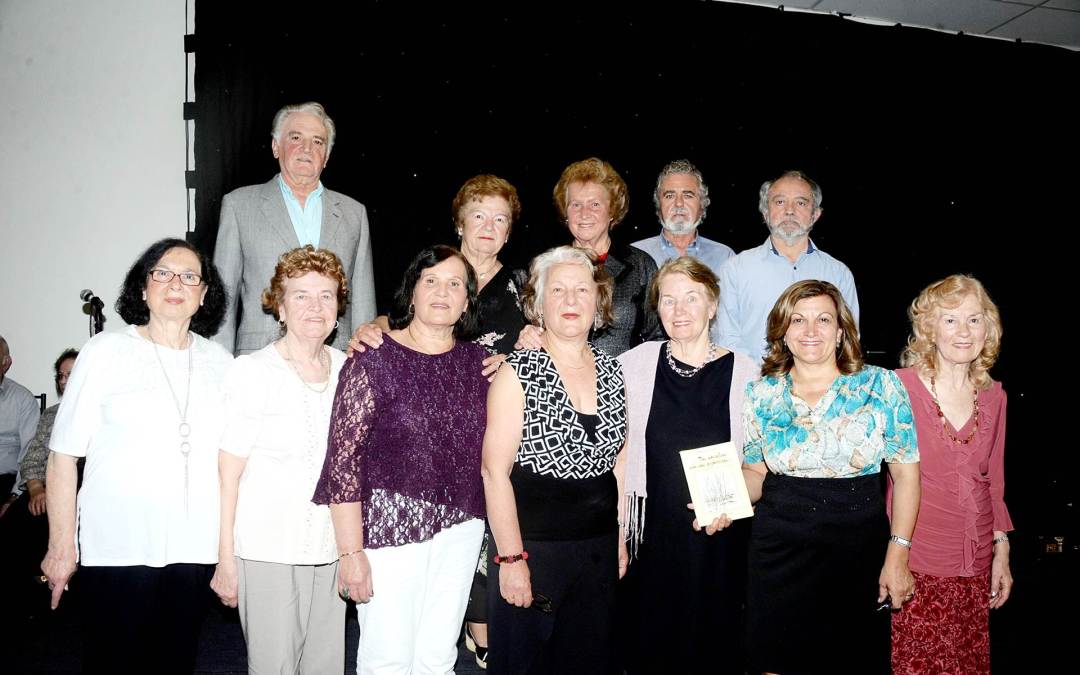
On Sunday 12th October 2014, Ioannna Liakakou launched her latest poetry collection, «…της μοναξιάς και της αγρύπνιας…» at the Pontian Community of Melbourne, 345 Victoria St., Brunswick. The book was launched by writer and poet, Mrs Andrea Garivaldis.
Launching the book, Ms Garivaldis said:
“I have chosen to speak about Ioanna, the person, the writer, the activist, the friend, rather than speak specifically about the book we are launching today approximately titled “…of loneliness and of wakefulness/vigilance…” because I felt that this poetry collection is the sum total of all the works of this writer who has been in the forefront promoting the written and spoken Greek word for far too many years to mention. And in any case what is time and who is bothered by it?
Before I started writing a brief overview of Ioanna’s literary contribution to the Greek Diaspora, I began trawling through my welcoming speeches of past book launches written for her and rediscovered her broad spectrum of writing styles in poetry and short stories on subject matter that ranged from love, hate, war, peace, friendship, loneliness, deprivation, family, social injustice, inequality, religion, philosophy, music, happiness, pain, memories, grief, migration, asylum seekers, (101) etc.,-a bottomless well of topics that touch our everyday existence.
Ioanna’s preoccupation with such an extensive range of issues and her insatiable pursuit to speak her mind publically produced the book in 2011 which was a compilation of selected letters written to the Greek newspapers. The title “Letters to the World” is in some ways a play on words because most of the letters were published in the Greek newspaper aptly named “The New World”. She opens the book with the quote-“If you fear, do not speak, if you speak, do not fear.” Personally I think that this saying embodies Ioanna’s philosophy on life.
She has produced since 1983, the year she published her first poetry collection, with today’s publication, 13 books- 6 poetry collections, 6 short story books and the abovementioned collection of letters.
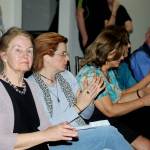
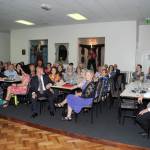
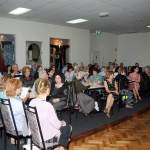
She is a prolific writer contributing her works to periodicals and anthologies in Greece and Australia, such as “Antipodes”, “O Logos”, “Nea Ariadni”, “Keleno”, and countless others. She has also written articles, critical essays and presented many books of aspiring writers in our Community.
It would be remiss of me not to mention Ioanna’s incessant voluntary contribution in assisting those men and women who needed guidance in starting out their literary career. Countless are those who have been assisted by her expertise in the literary arena in order to achieve better outcomes in their formative years in writing in the different genres in the Greek language.
She has been bestowed various literary awards by prestigious organisations from Australia and Greece. Her capacity to give to others openly without any monetary compensation has been demonstrated all these years. She was one of the founding members of the Hellenic Writers Association as well as serving on the Board of the GACL for a number of years. For a long time now Ioanna has been holding literary classes in the Greek language at Northcote Library, assisting many writers who were not fortunate enough to learn their language in their homeland.
Ioanna was born in one of the most beautiful parts of Greece-Aigion, a place I call my second home as well. It combines mountains and sea, orchards, vineyards, olive groves, fishing and a lot of ancient Greek history. She was born just before the Second World War years that were filled with austerity and deprivation but Ioanna was inspired by the wonderful environment around her and her warm but austere family upbringing to become the person that she is –caring, compassionate and full of enthusiasm for life.
Some of her short stories are filled with memories of the hardships experienced during the troubled times of the war and reveal the anguish the people from the countryside underwent for survival. She reflects on the youthful dreams and aspirations and comes out from all this fearless, free-spirited and determined. Ioanna also writes about the migrant experience. She has experienced this only too well as a mother of 4 children, a devoted wife, running a business as well as having to learn the language and come to terms with the new customs and norms of her new homeland. She has a positive, optimistic outlook to life and this has sustained all these years in spite of adversity.
I have translated from her latest poetry collection two quotes that demonstrate this-
“Courage is man’s most important quality in life’s struggles.”
“Don’t give up in the face of Adversity.”
And just a few words about the latest poetry collection, as I mentioned at the beginning Ioanna has a lot to say and finds a different writing style to say this in the form of quotes, sayings and poems. She laments about the more blissful years in the following poem-
The carefree years have passed
and the songs and happiness have disappeared
now silence and loneliness
patience and courage once again
silence and loneliness
and ends up touching on another very topical issue of aging…
This latest poetry collection defines once again the inquiring mind and the sensitive nature of the writer.
Congratulations Ioanna for another milestone in your writing path. Continue creating because as you personally said back in March 2003 when we presented your book “…almost the same”, and I quote, “…I am compelled to write because for me it is a way of life, it is my life, I write to find answers.”
I think that you are an eternal optimist and an incurable romantic…and we love you for it.”
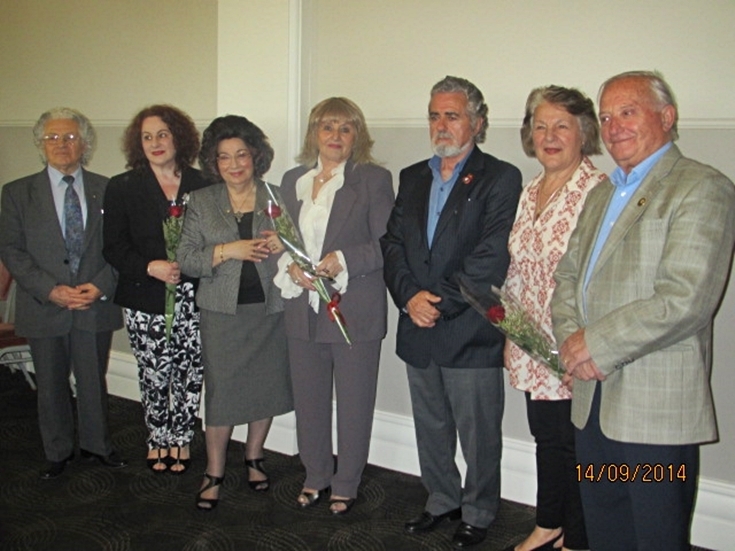
Two poetry collections of Dina Amanatides, “Fragile World” and “Burning Experiences”, were recently launched at the Panarcadian Association of Melbourne “O Kolokotronis”. The books were officially launched by the journalist and writer, Vivienne Morris.
This particularly significant event in this year’s cultural calendar within the Greek-Australian community is encased within the Panarcadian Association’s celebration to mark the anniversary of Tripoli’s liberation on the 23rd of September 1821, in collaboration with the Greek-Australian Cultural League of Melbourne and the Hellenic Writers Association of Australia.
Konstandina Dounis introducing Vivienne Morris said:
She is an exceptionally accomplished person, widely known not only within the Greek community but within the wider Australian community as well. Moments such as this provide us with a welcome opportunity to reflect on her many and varied undertakings, to marvel at the professionalism displayed throughout, and to extend to her our heartfelt appreciation.
Vivienne Morris was born in Mytilini, Lesvos, where she completed her high school studies. After migrating to Melbourne, she continued her studies at Melbourne University, excelling in Classical Studies and Modern Greek, and winning the Vrahnas Memorial Award for excellence in Greek Studies. She taught Greek at both secondary and tertiary levels, her respect for education reflected in her eventually becoming the Founder and Executive Director of the Australian Hellenic Centre of Education (Open University). Vivienne has been passionate about the dissemination of Greek language and culture and she has worked tirelessly in this regard. A small sample of her undertakings include:
Her “Portraits of Hellenes in Antipodes” wherein are included the stories of 40 Greek immigrants to this country, is a testament to her commitment to our community and establishes her as a writer of note.
However it is as a pioneer of the woman’s voice within Greek-Australian journalism that we know her best. Within the pages of Neos Kosmos, she has covered every topic, from the parochial to the political, with consummate professionalism. She is the recipient of the Hellenic Award, and the Victorian Government Award for Excellence in Multicultural Affairs, both awarded for her outstanding contribution to Journalism.
Dina Amanatides was born in Meligala, a township in Southern Greece. After completing her secondary studies in Athens, she migrated to Australia in 1958, and has since been living in Melbourne with her family. Her literary works have been published (either in the original Greek language or in English translation) in many newspapers and magazines in Australia, Greece, the USA and Canada, and have been included in numerous anthologies. Her poems and short stories have been taught extensively in Modern Greek Studies in Secondary Schools and Universities. She completed a Modern Greek Studies course at the New England University and has taught Greek language and literature at the secondary level for many years.
Dina Amanatides has been consistently writing for over 56 years, publishing 24 books, three of which have been reprinted four times. Her literary output covers poetry, short stories, scattered thoughts, and plays. She has won many literary competitions both here and overseas and has gained a plethora of awards and tributes.
The bestowing on Dina Amanatides of the Medal of the Order of Australia in the 2011 Queen’s Birthday Honours List is an extraordinary achievement, both on a personal level for Dina Amanatides, and on a community level for the entire Greek-Australian Diaspora. There are many dimensions to this award, the ramifications of which are profoundly important. Firstly, it demonstrates that talent and humility can be recognised and rewarded. It is, moreover, a testimony to the fact that literature is important, that it touches people’s lives, that it can offer hope and comfort, initiate joy, empathy and reflection. That the Australian Government should see fit to honour a Greek-Australian writer with this prestigious award demonstrates that what we – that is, writers, researchers, the Greek-Australian Cultural League, the Hellenic Writers Association – what we are doing is important, that it has validity within this country’s official perception of itself.
Concluding proceedings, Konstandina Dounis read the following poems from the two poetry collections of Dina Amanatides, Fragile World and Burning Experiences, which Konstandina herself translated into English for the occasion of the launch of the two books. It has to be said that Konstandina’s translation and recital of the poem “Memory’s Thief” brought tears in everybody’s eyes.
Memory’s Thief
I hold something tightly in my hands.
I think that it’s a set of keys.
Yes, I recognise them. Two keys.
They must be my house keys.
I know I have a house somewhere…
Familiar. A happy home once.
I lived there for many years.
I loved my husband madly. Passionately.
Now, I don’t even recognise his face.
I think I have children and grandchildren…
I don’t even remember them clearly…
I hold the keys in my hand.
I remember the road.
With green trees.
A quiet neighborhood.
Quietude and silence.
I venture onto the road.
The green trees look at me, enigmatically.
I search, seeking the number of my house.
I don’t remember it. I have forgotten the number.
All the surrounding houses are unfamiliar.
And yet, I do have a house…
Everyone there is anxiously waiting for me,
wondering why I am late.
How many days? How many years?
My thoughts are in a haze.
I can’t find the house
I no longer have a house…
I no longer remember beloved faces and objects.
I am lost
I am fading
I am the living dead
without memory…
All is extinguished.
It’s just that I still hold the keys in my hand,
but there are no doors to open.
Hands? Keys? I have nothing now.
Who am I? Where am I going?
I am lost…
I am fading…
Magic
And the stars
against the night’s darkness,
golden lilies.
Offering
We only invite others
when the occasion is joyous.
In times of sorrow
those who love us
come without invitation.
Giving Way
When you turn your back
to the sun
you give way
to your shadow.
City of Glass
Night.
From the ascending plane
on high
the city below is of many colours.
Decorated like a Christmas tree.
Fragile.
Iridescent.
As though made of glass.
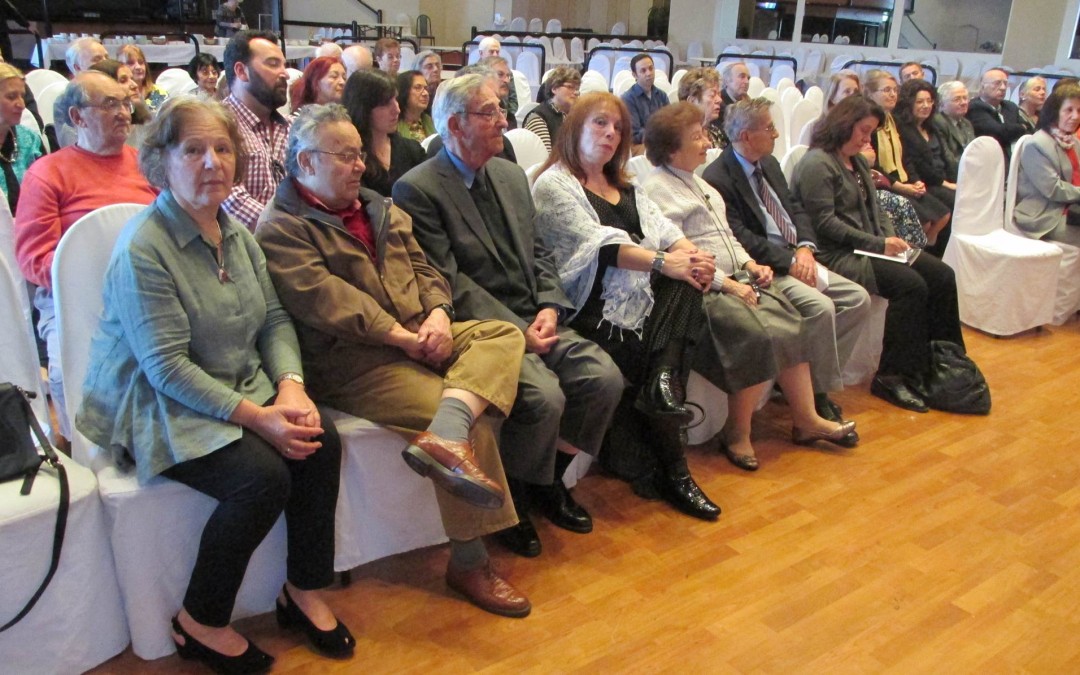
E.E.A.M.A. in collaboration with the Greek-Australian Cultural League launched Jim Saltis’ book “Blessings, Curses and Exorcisms”, on Sunday 31st August, 2014, 3.00pm, at the Stars International reception centre, 1C Bell Street, Preston.
The book was presented by the well known and acclaimed Alexandrian poet and artist, Nikos Nomikos. The launch was hosted by the GACL’s Secretary, Kathy Aronis
Talking about his book Jim Saltis said:
“I started writing my book “Blessings, curses and exorcisms” back in 1988, after my divorce. I bought a unit at Campsie and attempted to reorganise my life as a bachelor. My days were grey and the nights were endless. I was craving for some sleep but it refused to intervene and bring me some relief to my aching body and a break to my forever active brain. I named the Book “Mrs Stamata.” which was the name of the mother. It took many years to return to the skeletal draft, and complete it and renamed it “Blessings, curses and exorcisms.”
The novel is a collection of experiences which I encountered, fictions that were created by my cerebral fantasies, the perpetual movement of my mind and my invisible soul. The family consisted of mother and father, two boys and five girls. Their lives were marred by the unrelenting continuous poverty and each person reacted in an uncoordinated manner.
All the people you will encounter in this story were real but they were unrelated and were bonded as a family by the author. However their life experiences were real. Even the beautiful Flora (Madeline) who lived a daringly prodigal life by working as an aristocratic prostitute was lucky to meet, fall in love and married the very eligible Milton and experienced the immensity and tranquillity of true love. Maria accepted the poverty as it was. She found happiness in her love for her lazy husband. Dora encountered a very rich Egyptian who installed her in the best hotel of Alex the Cecil.
I compromised the saddening tragedy of Alecos and Sofia’s love and gave the reader a compromise for a happy ending by the philanthropic action of her boss Leon. Stamata died but she lives on as a ghost at the Greek section of the cemetery at Chatby awaiting the next Resurrection and to meet again with her son Alecos Dressed in faded black skirts with ungroomed white hair startles the passersby who do not know her h plight and some offer her monetary donations.
Now, all of us who were fortunate to be born in Egypt and more particular in the cosmopolitan Alexandria have dispersed at all corners of this hospitable planet. We travelled to new seas; we flew in skies and lands of places that we have learnt in Geography lessons. Most of us are well established in our new countries and we live carefree existences. Yet we are grateful that we were born in Egypt.”
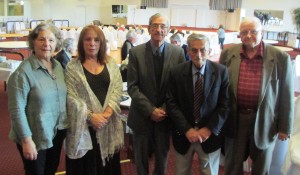 A few words about the book and the author:
A few words about the book and the author:
Alexandria was the city where I was born, grew up and finally left in January 1949, without hatred or wickedness. One night, after my divorce in 1988, when sleep was minimal and agitated I decided to put some exploitation to my insomnia and started writing my first book which I titled as “Mrs Stamata”.
Many years have logged since then, before finally I seriously went back to the skeletal book to turn it into a novel. The book includes my own empirical experiences and also fantasies that dwelled between my perpetually moving brain and my invisible soul.
The people you will encounter in this novel have lived their sojourn on this planet. Even the prodigal and very beautiful Flora (Madeline) who was lucky to experience the true live from Milton. I gave Sofia a happy ending after the untimely departure of her husband Alecos. Stamata died a long time ago but she carries on living as ghost at the Greek section of the cemetery at Chatby while waiting for the Second Coming of Jesus.
The book takes place in the Alexandrine district and it includes words from the different languages that the Europeans used including of course the Arabic. These days all of us who were born in the magical city of Alexandria, live dispersed on the hospitable planet. We have travelled on new seas and flew over skies and countries we have learned from our Geography books. We have comfortably settled and now enjoy leisurely existences in our old age. Yet are always grateful that we were born in Egypt.

